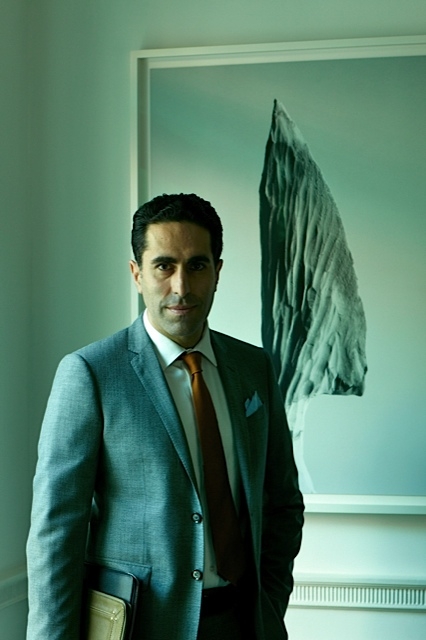In the following interview, translated from the Viennese art and culture magazine PARNASS, Amir Shariat and Silvie Aigner discuss Amir’s beginnings as a collector and curator, his current interests as well as some of the past shows he has curated. The interview forms part of a special edition released by PARNASS in anticipation of the upcoming viennecontemporary art fair taking place September 24 – 27th, 2015.
Amir Shariat
Amir Shariat is a collector and curator who grew up in Vienna as the son of an art dealer. His own collection began with a painting by the 19th century artist Ferdinand Georg Waldmüller. Today his collection and his curatorial projects are focused on art made after 1960, which he uses to great effect to create interesting dialogues in his collection and projects.
You were raised in Vienna surrounded by art, yet they were mainly old masters. After graduating from the Vienna University of Economics you initially started a career in investment banking but rediscovered soon thereafter your passion for art. Today you focus on contemporary art.
I grew up mainly with works from the Renaissance and paintings of the 19th century. I collect contemporary art and modern art post 1960, mainly abstract or minimal art. I wanted to collect art of my generation. In terms of emerging contemporary art, I buy what I like with a focus on the quality and the creativity of the artwork. I do not collect according to medium, although admittedly I prefer paintings to photography. Yet one should not limit art to its medium.
In your biography, you also mention your activity as an art advisor, do you advise collectors or manage collections? According to you what are the attributes of a good collection?
Amongst my circle of friends I recommend artists and advise amongst others some very important collectors. I work mainly in on art projects by curating exhibitions for galleries and art fairs. A good collection is not created overnight – it requires experience and connoisseurship. It is important that one collects with one’s eyes and not with the ears. It is imperative to not see art purely as an investment, but to deal with the artwork and to buy only if you like the work and are convinced about it. As a collector one should always ask oneself before buying a work of art: is it something that I like? This is certainly not the only issue, but a very important one nevertheless. The strength of the artwork should be a more important consideration than the artist’s position within the art world or his exhibition record and this is where collectors can make a difference by underlining their belief via purchases.
You juxtaposed in your very first curated show “Bass! How low can you go?” Leila Heller Gallery in New York during the spring of 2013 up-and-coming artists not only with established ones, and even iconic artists. “TALKlikeSEX”, a group exhibition in New York, showcased works of the Italian Zero group alongside contemporary artists who were influenced by them.
The exhibition showed up-and-coming artists such as Anthony Pearson, Raphael Danke or Sheree Hovsepian alongside revolutionary artworks by Lucio Fontana, Robert Rauschenberg and Andy Warhol amongst others. I find these juxtapositions of enormous interest and this is why it was repeated in TALKlikeSEX. Other exhibitions such as “Eye Know” which I curated with the assistance of Neuer Kunstverein Wien, showed a young generation of artists from Los Angeles and Vienna. The starting point were the many current residencies of Austrian artists in L.A. which created an interesting dialogue. One my last exhibitions was “I Know You Got Soul “, a group exhibition of young contemporary American art at ARNDT of Singapore.
You are connected with the Viennese art fair viennacontemporary for many years now. What is your opinion regarding Vienna as a location?
The quality of the artists is high and the galleries do a very good job. Hence I am a believer and supporter of viennacontemporary. It is important to get more international opinion leaders in order to give the fair and Vienna a more international flair.
